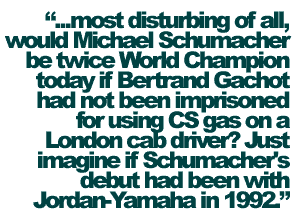

| The New Breed |
|
|
| by Paul Rushworth, England |
 The Canadian Grand Prix last weekend was a
surprising event in many different ways. The early fall of Villeneuve, McLaren's rejuvenation to
genuine race contenders, Tyrrell's outstanding performance, and the inability of Stewart to deliver on
Rubens Barrichello's qualifying form. The most outstanding event in
my opinion, however, was the superb performance of Formula One's newest recruit, Alexander Wurz.
The Canadian Grand Prix last weekend was a
surprising event in many different ways. The early fall of Villeneuve, McLaren's rejuvenation to
genuine race contenders, Tyrrell's outstanding performance, and the inability of Stewart to deliver on
Rubens Barrichello's qualifying form. The most outstanding event in
my opinion, however, was the superb performance of Formula One's newest recruit, Alexander Wurz.
In his debut performance at a track that was completely new to him, Wurz qualified a very respectable 3 places and 0.4 seconds behind his vastly experienced team-mate. In the race, he likewise acquitted himself very respectably -- running in the points and set to score in his first Grand Prix until driveshaft problems lead to his retirement. Indeed, the only blemish on an otherwise outstanding debut performance was his crash in qualifying which lead to the red flagging of the session.
It seems we have not seen the last of Wurz this season. Gerhard Berger is expected to be undergoing further surgery for his sinus problem and may sit out the French Grand Prix as well.
The unfortunate accident, which left Olivier Panis out of a Formula One car for the rest of the season, will possibly allow a new debutante at the French Grand Prix. While nothing to this date has been confirmed, it seems likely that Emmanuel Collard will make the debut at his home Grand Prix for Prost-Mugen Honda. Other drivers have been mentioned such as Jean-Christophe Boullion. However, Bridgestone might balk at the idea of a test driver for a Goodyear team being allowed access to their latest equipment. While I would delight at the idea of Andrea Montermini being in the frame for such a drive, it seems almost certain that a French driver will fill this vacant seat.
Disturbingly, you may have noticed a trend developing. For the debuts of young, highly qualified drivers to occur, something unfortunate has to effect the original driver of the team. The days of more seats than capable drivers are over; we are now experiencing the opposite.
Would Giancarlo Fisichella be currently impressing us had it not been for the sponsorship problems that Taki Inoue suffered in early 1996? Would Jos Verstappen be in Formula One if it were not for the broken neck that J.J. Lehto suffered in pre-season testing in 1994? Would David Coulthard have made it into Formula One without the tragedy that rocked Formula One at Imola in 1994?
Perhaps most disturbing of all, would Michael Schumacher be twice World Champion today if Bertrand Gachot had not been imprisoned for using CS gas on a London cab driver? Just imagine if Schumacher's debut had been with Jordan-Yamaha in 1992!
This is a genuine problem of the sport as of late. In 1997, we have 12 teams. In 1989, there were 20 teams with 38 cars entered. There are not enough seats available for young talent to have the opportunity to develop. Also, we have seen such questionable talent as Phillipe Adams, Giovanni Lavaggi, Jean-Denis Deletraz, Taki Inoue, Pedro Diniz, Shinji Nakano and Hideki Noda fill seats that could otherwise have been used by genuine young talent with skills to prove and develop.
Somewhere in Formula Nippon, European F3000, the FIA GT Championship or other feeder formulae, there is bound to be a true World Champion in waiting. For both the sport, and our sakes, let us hope that they will have the opportunity to make themselves know in Formula One.
And soon.